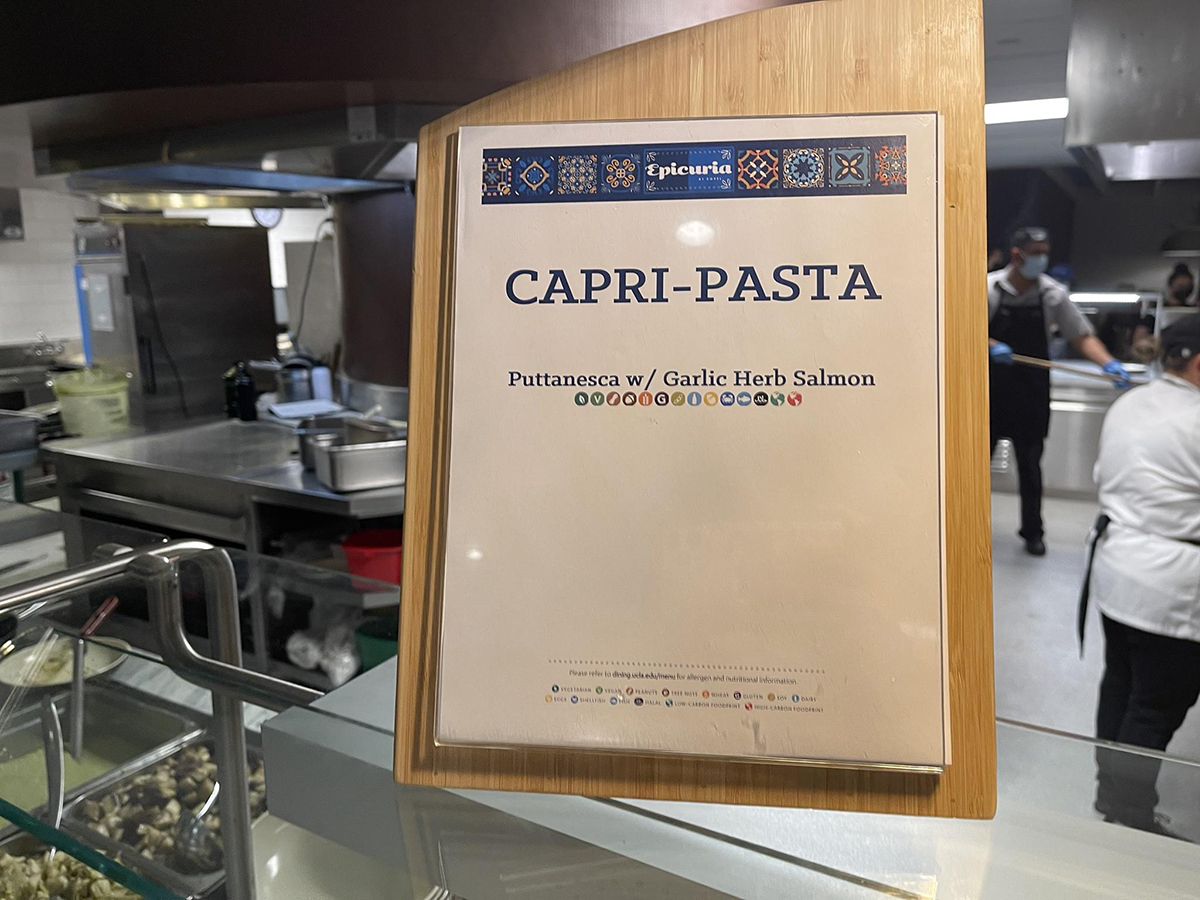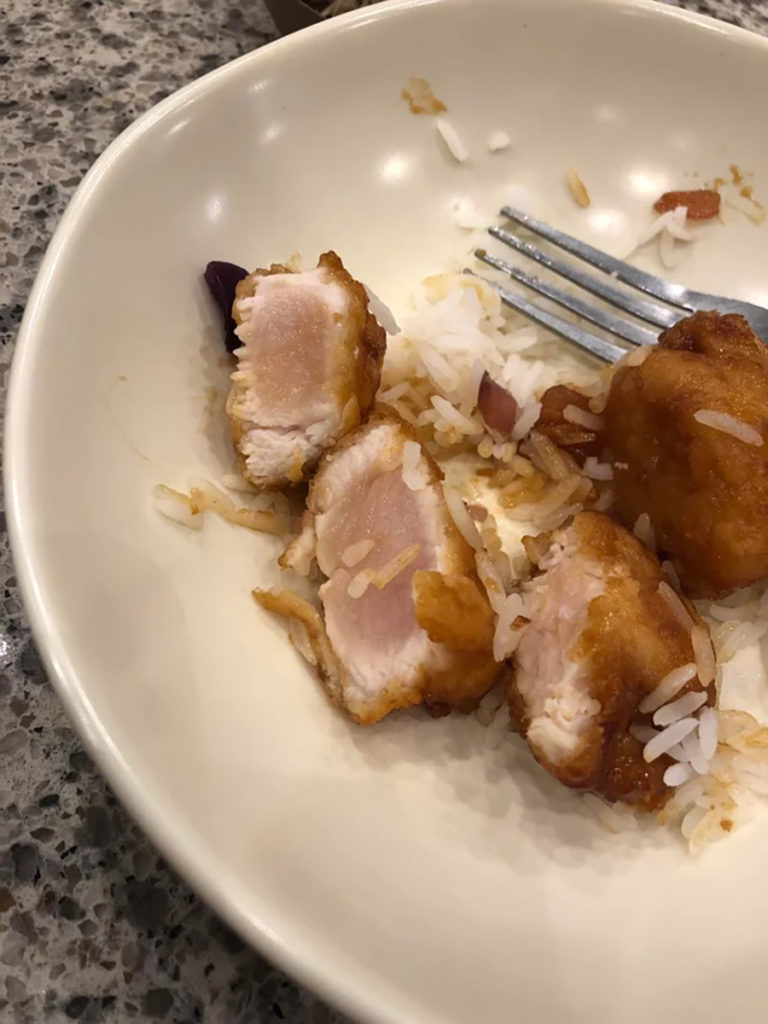Students question food safety practices at UCLA dining halls

Students with dietary restrictions expressed concerns about some dining halls’ food labels, citing inaccurate allergen and dietary restriction information. (Courtesy of Aditya Sundaram)

By Constanza Montemayor
Oct. 31, 2021 11:41 p.m.
This post was updated Nov. 3 at 9:20 p.m.
Students are raising concerns about unsafe food practices in dining halls following incidents involving undercooked poultry and inaccurate dietary restriction and ingredient labels.
Since the return to campus for fall quarter, students have flooded back into the dining halls, some of which had been closed since 2020. Meanwhile, a staffing shortage has limited the operations of UCLA Dining and left one dining hall closed.
[Related: Students face long lines, wait times at dining halls amid staffing shortage]
Several students have expressed worry about food safety at some dining halls.
Alex Wazzan, a third-year computer science student, was eating orange chicken at De Neve dining hall Tuesday when he cut a large piece open to find it was undercooked, he said.
“I got a knife, cut (the piece) in half, and the entire center was just dark pink, which was pretty disgusting,” he said.

Wazzan had seen another student make a post about the same issue with the De Neve dish in the UCLA subreddit, he said, and decided to upload his own photo to the site. Other users responded to his post in agreement on the issue and expressed their own concerns as well.
“Given how many students go to these dining halls and how long the orange chicken line was when I got there, if every single dish looks like that, then there could definitely be some concerns,” Wazzan said.
Guests are encouraged to submit any concerns they may have to the Dine and Dish portal or to speak with the manager at the affected location to help UCLA Dining promptly and efficiently resolve issues, UCLA Dining said in an emailed statement.
“Our on-campus dining program serves roughly 30,000 meals daily and we strive to make everyone’s dining experience a positive one,” UCLA Dining added in the statement. “We are sorry that we fell short in these instances.”
Wazzan said although he did not feel sick from what he ate, he was concerned when he realized the problem.
“I know the chances of anything happening are pretty low, but it made me wonder what all the other pieces that they’re handing out are like and whether every student is getting similar food,” he added.
Wazzan said the experience has caused him to avoid De Neve dining hall.
Other students said the dietary restriction and ingredient labeling on foods in some dining halls were sometimes inaccurate.
Aditya Sundaram, a second-year computational and systems biology student, said he is vegetarian and checks food labels before he decides what to eat.
Sundaram was in Epicuria when he noticed a sign that mislabeled a salmon dish as vegan and vegetarian, he said.
Sundaram said he alerted his resident assistant at Hedrick Summit and submitted a photo he took of the inaccurate labels.
“I saw the herb salmon pasta, but then it had like halal, gluten-free, with wheat, shellfish and literally every single possible label at the same time,” Sundaram said. “I took a picture of it, and it cracks me up, but at the same time, it was kind of like, ‘Well, I don’t know what it has anymore.’”
Sundaram later encountered a similar issue at Rendezvous, he added. Sundaram said he was ordering soup as part of a meal that was labeled vegan when he saw the online ingredient list included fish.
Mislabeling meat products as vegan or vegetarian may cause distress to some individuals, Sundaram said.
“It could be very harmful mentally … if it doesn’t do anything physically,” he said. “I feel like it’s not a difficult problem to address either.”
Nikolai Haines, a second-year bioengineering student, said he nearly had an allergic reaction due to mislabeling in the dining halls. Haines said he has a life-threatening peanut allergy and keeps track of allergen information in dining hall foods.
Earlier this year, Haines ate food from a dining hall carrying a warning for potential allergens. Although he did not have a medical emergency, it was unclear whether the label’s wording meant that the food included peanuts or was prepared in a kitchen that processes peanuts, leaving him worried, Haines said.
Another time, Haines said he read a cookie’s allergen information card in De Neve and took it to his table, believing it to be safe to eat because the label did not list peanuts as an allergen.
“‘I was like, ‘OK, I’ll go ahead and grab some of those,’ and then I sat down, and just to double check, I checked (the) online menu and boom, it said peanuts,” he said. “I didn’t know which one was right, so I just had to throw it away.”
Like Wazzan, Haines shared his experience on the UCLA community on Reddit and found other users who said they had the same issue in the dining halls.
He now checks both in-person and online menus and picks through his food to ensure it is peanut-free, Haines added.
“For example, plain chicken – I thought would be completely harmless, and then I go and take a look at the online menu, and it says peanuts. So I assume it has peanut oil, but it’s hard to just look at it and tell,” he said.
Haines said that although his experiences with allergen labeling in the dining halls had made him hesitant to try new foods there, they are some of his only food options on campus.
“Unfortunately, I don’t see much of a solution except more attention to detail, and even when I ask servers or people that work in the dining departments, they’re really unsure what’s actually in the food,” Haines said. “Just more precision to detail would be probably the only solution that I can see so far.”


